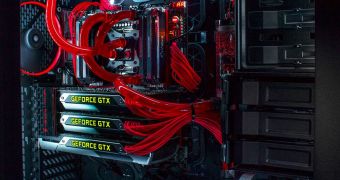Gaming PCs are widely known as one of the most power demanding home electronics one can have. With power cells that nowadays can eat 1.5KW and more, PCs now consume more power than washing machines, fridges or vacuum cleaners, effectively being the most power hungry home device available.
This assessment is now proven by a study about the amount of energy gaming PCs consume on a daily basis, and how it slowly becomes a major issue for anyone who sees his energy bills increase every time a new PC system is being bought. It's quite obvious that for PC gamers who use overclocked CPUs together with an advanced graphics card and a power supply to match them, this study isn’t a surprise. In fact, that’s the whole point these days, since the more power hungry a GPU or CPU is, the better it will perform.
However, Berkley Lab published a study this week that gaming PCs may account for just 2.5 percent of personal computers in use globally, but account for a whopping 20 per cent of the energy used by all PCs, meaning 75 TWh/year (that costs about $10 billion). They estimated that a typical gaming computer (including display) uses approximately 1400 kWh/year, which is equivalent to the energy use of ten game consoles, six standard PCs, or three refrigerators. The more intensive user segments could easily consume double this central estimate.
Gaming PCs don't always need to be everlastingly power-hungry
According to the study’s authors, Evan and Nathaniel Mills, the gaming PC is a huge source of energy use that remained overlooked for years right under our noses. Although ordinary PCs have been under a strong energy efficiency scrutiny for a long time to encourage mobility and ease of use, gaming PCs remained untouched for a very long time, these days requiring more and more power once a new generation GPU or central processing unit is being developed.
The pair of father-and-son researchers believe that there are already off-the-shelf solutions for this issue, publishing details and more energy efficient gaming PC solutions on their site called Greening the Beast. This way they hope that gamers will keep energy consumption under a tight scrutiny, and obviously save some bucks.

 14 DAY TRIAL //
14 DAY TRIAL //